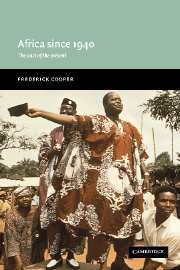Book contents
- Frontmatter
- Contents
- List of plates
- List of figures
- List of maps
- List of tables
- Preface
- Map 1 Africa: countries and cities, c. 2000
- 1 Introduction: from colonies to Third World
- 2 Workers, peasants, and the crisis of colonialism
- 3 Citizenship, self-government, and development: the possibilities of the post-war moment
- 4 Ending empire and imagining the future
- Interlude: rhythms of change in the post-war world
- 5 Development and disappointment: social and economic change in an unequal world, 1945–2000
- 6 The late decolonizations: southern Africa 1975, 1979, 1994
- 7 The recurrent crises of the gatekeeper state
- 8 Africa at the century's turn: South Africa, Rwanda, and beyond
- Index
Preface
- Frontmatter
- Contents
- List of plates
- List of figures
- List of maps
- List of tables
- Preface
- Map 1 Africa: countries and cities, c. 2000
- 1 Introduction: from colonies to Third World
- 2 Workers, peasants, and the crisis of colonialism
- 3 Citizenship, self-government, and development: the possibilities of the post-war moment
- 4 Ending empire and imagining the future
- Interlude: rhythms of change in the post-war world
- 5 Development and disappointment: social and economic change in an unequal world, 1945–2000
- 6 The late decolonizations: southern Africa 1975, 1979, 1994
- 7 The recurrent crises of the gatekeeper state
- 8 Africa at the century's turn: South Africa, Rwanda, and beyond
- Index
Summary
It is now forty years since the exciting, hopeful days when most French, British, and Belgian colonies emerged as independent states. Still, much writing on politics, development, or other aspects of contemporary Africa treats this period, or the post-World War II era generally, more as background than as a subject for consideration, while most textbooks and many courses in African history treat this period more as an epilogue than as a full part of the continent's history. The present book attempts to meet the needs of general readers, students, and teachers who would like to do more than that, who want to look at the past of the present in a more coherent way. The dividing line between colonial and independence eras is sometimes thought of so axiomatically that no one asks just what difference acquiring sovereignty made – especially given the continued inequalities of the world order – and just what processes unfolded over a longer time frame. In many ways, the time of World War II (really the late 1930s through the late 1940s) is as important a break point as the moment of independence. More precisely, different aspects of African history present different rhythms and ruptures, different continuities, adaptations, and innovations – a theme developed in the “Interlude”. The book is organized to promote discussion of such issues.
- Type
- Chapter
- Information
- Africa since 1940The Past of the Present, pp. xi - xiiPublisher: Cambridge University PressPrint publication year: 2002

